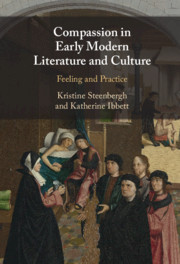Book contents
- Compassion in Early Modern Literature and Culture
- Compassion in Early Modern Literature and Culture
- Copyright page
- Contents
- Acknowledgements
- Contributors
- Introduction
- Part I Theorising
- Part II Consoling
- Part III Exhorting
- Part IV Performing
- Part V Responding
- Part VI Giving
- Part VII Racialising
- Chapter 13 Pity and Empire in the Brevísima relación de la destrucción de las Indias (1552)
- Chapter 14 ‘Our Black Hero’
- Part VIII Contemporary Compassions
- Index
Chapter 13 - Pity and Empire in the Brevísima relación de la destrucción de las Indias (1552)
from Part VII - Racialising
Published online by Cambridge University Press: 23 April 2021
- Compassion in Early Modern Literature and Culture
- Compassion in Early Modern Literature and Culture
- Copyright page
- Contents
- Acknowledgements
- Contributors
- Introduction
- Part I Theorising
- Part II Consoling
- Part III Exhorting
- Part IV Performing
- Part V Responding
- Part VI Giving
- Part VII Racialising
- Chapter 13 Pity and Empire in the Brevísima relación de la destrucción de las Indias (1552)
- Chapter 14 ‘Our Black Hero’
- Part VIII Contemporary Compassions
- Index
Summary
Matthew Goldmark examines the role of compassion in the Dominican friar Bartolomé de las Casas’s famous condemnation of sixteenth-century Spanish conquest, the Brevísima relación de la destrucción de las Indias (1552), which describes Spaniards’ violent attacks on defenceless indigenous populations across the so-called New World. Goldmark argue that in the Brevísima relación, affect justifies action; it is the sight of indigenous suffering that obliges the text’s royal recipient Phillip II to stop the violent destruction perpetrated by his unmanaged vassals in the New World. While scholars have mined the juridical, classical and religious source base that Las Casas employs in the Brevísima relación, few have placed emotion at the centre of this intellectual inquiry. In this chapter, Goldmark argues that emotion – specifically pity – is essential to the Brevísima relación’s defence of indigenous peoples and, as important, to its creation of a transatlantic imperial relationship between 'Indians' and the Crown. In the Brevísima relación, pity identifies a hierarchical relation that obliges intervention from a powerful imperial witness-authority. Thus, the affective imperative created by pity is not one of contemplation of an equal, but rather a call to action for an Other whose relation to empire remains undetermined.
Keywords
- Type
- Chapter
- Information
- Compassion in Early Modern Literature and CultureFeeling and Practice, pp. 257 - 272Publisher: Cambridge University PressPrint publication year: 2021



